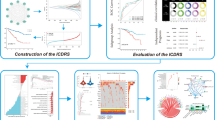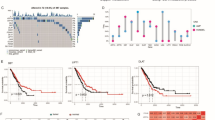Abstract
The immunogenic cell death (ICD) is a specific type of regulatory cell death (RCD), which induces adaptive immunity against antigens of dead cells. ICDs have received increasing attention for their potential role in tumor microenvironment reprogramming and immunotherapy. However, the relationship between ICD-related features and stomach adenocarcinoma (STAD) prognosis, immune cell infiltration and immunotherapy remains unclear. Patients were divided into different ICD-related subtypes by consensus clustering. The differences in prognosis, Tumor microenvironment (TME), and immune checkpoint expression between different ICD-related subtypes were systematically assessed. Additionally, we constructed an ICD-related gene risk score (ICDRS). We systematically analyzed the correlation between ICDRS and prognosis, TME, immunotherapy response and drug sensitivity of gastric cancer. In addition, we explored the role of TGM2 in promoting gastric cancer progression through in vitro experiments. We identified three ICD-associated subtypes by consensus clustering. The ICD gene was highly expressed in Cluster B. Compared with the other two subtypes, Cluster B had better prognosis, higher immune response signaling activity, massive immune cell infiltration and lower tumor purity. Immune checkpoint (ICP) and human leukocyte antigen (HLA) related genes were also highly expressed in Cluster B. In addition, we found that ICDRS is an effective indicator for predicting the prognosis and immune efficacy of STAD. The low ICDRS group has the characteristics of good prognosis, high tumor mutation burden (TMB), high microsatellite instability (MSI), and sensitivity to immunotherapy, while the high ICDRS group is prone to immune escape and immunotherapy resistance. In addition, we found that down-regulating TGM2 gene can inhibit the proliferation and migration of gastric cancer cells through in vitro experiments. Our study found that the model based on ICD features is helpful to clarify the TME characteristics of STAD, and has important clinical significance for evaluating the prognosis and immunotherapy response of STAD patients. TGM2 plays an important role in the progression of STAD, suggesting that TGM2 can be used as a new target for the treatment of STAD.












Similar content being viewed by others
Data availability
The datasets analyzed during the current study are available at TCGA-STAD [GDC (GDC (cancer.gov)], GSE84437 [GEO Accession viewer (nih.gov)] and Supplementary Materials.
Abbreviations
- ICD:
-
Immunogenic cell death
- RCD:
-
Regulatory cell death
- TME:
-
Tumor microenvironment
- STAD:
-
Stomach adenocarcinoma
- GC:
-
Gastric cancer
- ICDRS:
-
ICD-related gene risk score
- TMB:
-
Tumor mutation burden
- MSI:
-
Microsatellite instability
- ICIs:
-
Immune checkpoint inhibitors
- DAMPs:
-
Damage-associated molecular patterns
- TCGA:
-
The Cancer Genome Atlas
- GEO:
-
Gene Expression Omnibus
- GSVA:
-
Gene set variation analysis
- ssGSEA:
-
Single-sample gene set enrichment analysis
- DEGs:
-
Differentially expressed genes
- OS:
-
Overall survival time
- TIDE:
-
Tumor immune dysfunction and exclusion
- ImmuCellIA:
-
Abundance of immune cell infiltrates
- RNAss:
-
RNA stemness score
References
Bray F, Ferlay J, Soerjomataram I, Siegel RL, Torre LA, Jemal A (2018) Global cancer statistics 2018: GLOBOCAN estimates of incidence and mortality worldwide for 36 cancers in 185 countries. CA Cancer J Clin 68(6):394–424
Gambardella V, Castillo J, Tarazona N, Gimeno-Valiente F, Martínez-Ciarpaglini C, Cabeza-Segura M et al (2020) The role of tumor-associated macrophages in gastric cancer development and their potential as a therapeutic target. Cancer Treat Rev 86:102015
Russo AE, Strong VE (2019) Gastric cancer etiology and management in Asia and the West. Annu Rev Med 70:353–367
Chalabi M, Fanchi LF, Dijkstra KK, Van den Berg JG, Aalbers AG, Sikorska K et al (2020) Neoadjuvant immunotherapy leads to pathological responses in MMR-proficient and MMR-deficient early-stage colon cancers. Nat Med 26(4):566–576
Sheih A, Voillet V, Hanafi LA, DeBerg HA, Yajima M, Hawkins R et al (2020) Clonal kinetics and single-cell transcriptional profiling of CAR-T cells in patients undergoing CD19 CAR-T immunotherapy. Nat Commun 11(1):219
Riley RS, June CH, Langer R, Mitchell MJ (2019) Delivery technologies for cancer immunotherapy. Nat Rev Drug Discov 18(3):175–196
Zhang Y, Zhang Z (2020) The history and advances in cancer immunotherapy: understanding the characteristics of tumor-infiltrating immune cells and their therapeutic implications. Cell Mol Immunol 17(8):807–821
Ribas A, Wolchok JD (2018) Cancer immunotherapy using checkpoint blockade. Science (New York, NY) 359(6382):1350–1355
Sharma P, Hu-Lieskovan S, Wargo JA, Ribas A (2017) Primary, adaptive, and acquired resistance to cancer immunotherapy. Cell 168(4):707–723
Nagarsheth N, Wicha MS, Zou W (2017) Chemokines in the cancer microenvironment and their relevance in cancer immunotherapy. Nat Rev Immunol 17(9):559–572
Shi Y, Lammers T (2019) Combining Nanomedicine and Immunotherapy. Acc Chem Res 52(6):1543–1554
Smyth MJ, Ngiow SF, Ribas A, Teng MW (2016) Combination cancer immunotherapies tailored to the tumour microenvironment. Nat Rev Clin Oncol 13(3):143–158
Jin MZ, Jin WL (2020) The updated landscape of tumor microenvironment and drug repurposing. Signal Transduct Target Ther 5(1):166
Li Z, Lai X, Fu S, Ren L, Cai H, Zhang H et al (2022) Immunogenic cell death activates the tumor immune microenvironment to boost the immunotherapy efficiency. Adv Sci 9(22):e2201734
Fucikova J, Kepp O, Kasikova L, Petroni G, Yamazaki T, Liu P et al (2020) Detection of immunogenic cell death and its relevance for cancer therapy. Cell Death Dis 11(11):1013
Galluzzi L, Vitale I, Warren S, Adjemian S, Agostinis P, Martinez AB et al (2020) Consensus guidelines for the definition, detection and interpretation of immunogenic cell death. J Immunother Cancer 8(1):e000337
Jin MZ, Wang XP (2021) Immunogenic cell death-based cancer vaccines. Front Immunol 12:697964
Alzeibak R, Mishchenko TA, Shilyagina NY, Balalaeva IV, Vedunova MV, Krysko DV (2021) Targeting immunogenic cancer cell death by photodynamic therapy: past, present and future. J Immunother Cancer 9(1):e001926
Lau TS, Chan LKY, Man GCW, Wong CH, Lee JHS, Yim SF et al (2020) Paclitaxel induces immunogenic cell death in ovarian cancer via TLR4/IKK2/SNARE-dependent exocytosis. Cancer Immunol Res 8(8):1099–1111
Wang X, Wu S, Liu F, Ke D, Wang X, Pan D et al (2021) An Immunogenic cell death-related classification predicts prognosis and response to immunotherapy in head and neck squamous cell carcinoma. Front Immunol 12:781466
Clifton GT, Rothenberg M, Ascierto PA, Begley G, Cecchini M, Eder JP et al (2023) Developing a definition of immune exclusion in cancer: results of a modified Delphi workshop. J Immunother Cancer 11(6):e006773
Liu YT, Sun ZJ (2021) Turning cold tumors into hot tumors by improving T-cell infiltration. Theranostics 11(11):5365–5386
Turley SJ, Cremasco V, Astarita JL (2015) Immunological hallmarks of stromal cells in the tumour microenvironment. Nat Rev Immunol 15(11):669–682
Kroemer G, Galassi C, Zitvogel L, Galluzzi L (2022) Immunogenic cell stress and death. Nat Immunol 23(4):487–500
Ahmed A, Tait SWG (2020) Targeting immunogenic cell death in cancer. Mol Oncol 14(12):2994–3006
Kroemer G, Galluzzi L, Kepp O, Zitvogel L (2013) Immunogenic cell death in cancer therapy. Annu Rev Immunol 31:51–72
Li Y, Zhang H, Li Q, Zou P, Huang X, Wu C et al (2020) CDK12/13 inhibition induces immunogenic cell death and enhances anti-PD-1 anticancer activity in breast cancer. Cancer Lett 495:12–21
Duan X, Chan C, Lin W (2019) Nanoparticle-mediated immunogenic cell death enables and potentiates cancer immunotherapy. Angew Chem Int Ed Engl 58(3):670–680
Fu L, Zhou X, He C (2021) Polymeric nanosystems for immunogenic cell death-based cancer immunotherapy. Macromol Biosci 21(7):e2100075
Hsieh YF, Liu GY, Lee YJ, Yang JJ, Sándor K, Sarang Z et al (2013) Transglutaminase 2 contributes to apoptosis induction in Jurkat T cells by modulating Ca2+ homeostasis via cross-linking RAP1GDS1. PLoS One 8(12):e81516
Li C, Cai J, Ge F, Wang G (2018) TGM2 knockdown reverses cisplatin chemoresistance in osteosarcoma. Int J Mol Med 42(4):1799–1808
Fok JY, Ekmekcioglu S, Mehta K (2006) Implications of tissue transglutaminase expression in malignant melanoma. Mol Cancer Ther 5(6):1493–1503
Park KS, Kim HK, Lee JH, Choi YB, Park SY, Yang SH et al (2010) Transglutaminase 2 as a cisplatin resistance marker in non-small cell lung cancer. J Cancer Res Clin Oncol 136(4):493–502
Yang P, Yu D, Zhou J, Zhuang S, Jiang T (2019) TGM2 interference regulates the angiogenesis and apoptosis of colorectal cancer via Wnt/β-catenin pathway. Cell Cycle (Georgetown, Tex) 18(10):1122–1134
Agnihotri N, Kumar S, Mehta K (2013) Tissue transglutaminase as a central mediator in inflammation-induced progression of breast cancer. Breast Cancer Res 15(1):202
Naselsky W, Adhikary G, Shrestha S, Chen X, Ezeka G, Xu W et al (2022) Transglutaminase 2 enhances hepatocyte growth factor signaling to drive the mesothelioma cancer cell phenotype. Mol Carcinog 61(6):537–548
Zhao Q, Cao L, Guan L, Bie L, Wang S, Xie B et al (2019) Immunotherapy for gastric cancer: dilemmas and prospect. Brief Funct Genom 18(2):107–112
Vrána D, Matzenauer M, Neoral Č, Aujeský R, Vrba R, Melichar B et al (2018) From tumor immunology to immunotherapy in gastric and esophageal cancer. Int J Mol Sci 20(1):13
Pitt JM, Marabelle A, Eggermont A, Soria JC, Kroemer G, Zitvogel L (2016) Targeting the tumor microenvironment: removing obstruction to anticancer immune responses and immunotherapy. Ann Oncol 27(8):1482–1492
Lytle NK, Barber AG, Reya T (2018) Stem cell fate in cancer growth, progression and therapy resistance. Nat Rev Cancer 18(11):669–680
Bajaj J, Diaz E, Reya T (2020) Stem cells in cancer initiation and progression. J Cell Biol 219(1):e201911053
Ferguson LP, Diaz E, Reya T (2021) The role of the microenvironment and immune system in regulating stem cell fate in cancer. Trends Cancer 7(7):624–634
Acknowledgements
We would like to express our appreciation to TCGA-STAD [GDC (cancer.gov)] and GEO databases (https://www.ncbi.nlm.nih.gov/geo/) for providing the open-access databases utilized in this research study.
Funding
This research was funded by the Project of the Jiangxi Provincial Education Department of Science and Technology Research (Grant Number: GJJ2200234).
Author information
Authors and Affiliations
Contributions
ZTL, LS and XYP conceived and designed the study, CH and SCL collected the data and clinical specimens. ZTL and LS analyzed the data, searched the literature and evaluated the quality. ZMZ, ZTL, and CH prepared the first draft of the manuscript and corrected it. All the authors have read the manuscript and agreed to the final version of the manuscript.
Corresponding authors
Ethics declarations
Conflict of interest
All authors declare no conflict of interest.
Ethical approval
This study was approved by the Ethics Committee of the Second Affiliated Hospital of Nanchang University, and all patients signed informed consent.
Consent for publication
Not applicable.
Additional information
Publisher's Note
Springer Nature remains neutral with regard to jurisdictional claims in published maps and institutional affiliations.
Supplementary Information
Below is the link to the electronic supplementary material.
Rights and permissions
Springer Nature or its licensor (e.g. a society or other partner) holds exclusive rights to this article under a publishing agreement with the author(s) or other rightsholder(s); author self-archiving of the accepted manuscript version of this article is solely governed by the terms of such publishing agreement and applicable law.
About this article
Cite this article
Liu, Z., Sun, L., Peng, X. et al. An immunogenic cell death-related signature predicts prognosis and immunotherapy response in stomach adenocarcinoma. Apoptosis 28, 1564–1583 (2023). https://doi.org/10.1007/s10495-023-01879-5
Accepted:
Published:
Issue Date:
DOI: https://doi.org/10.1007/s10495-023-01879-5




